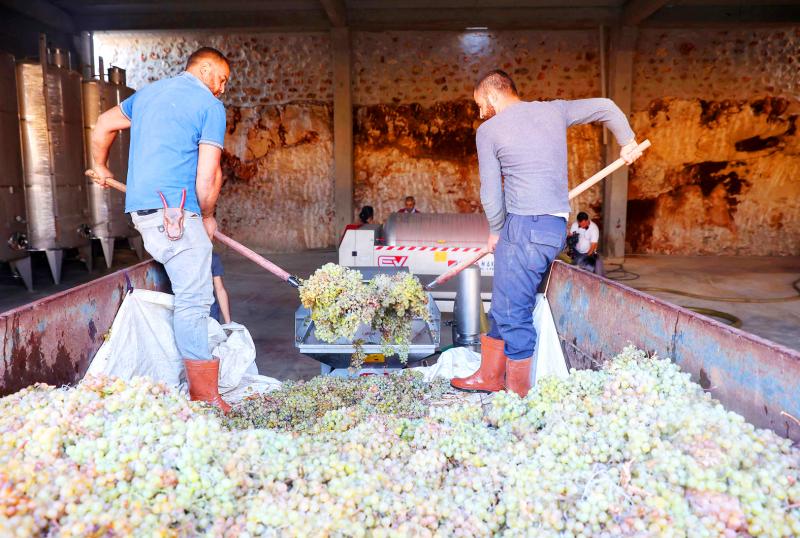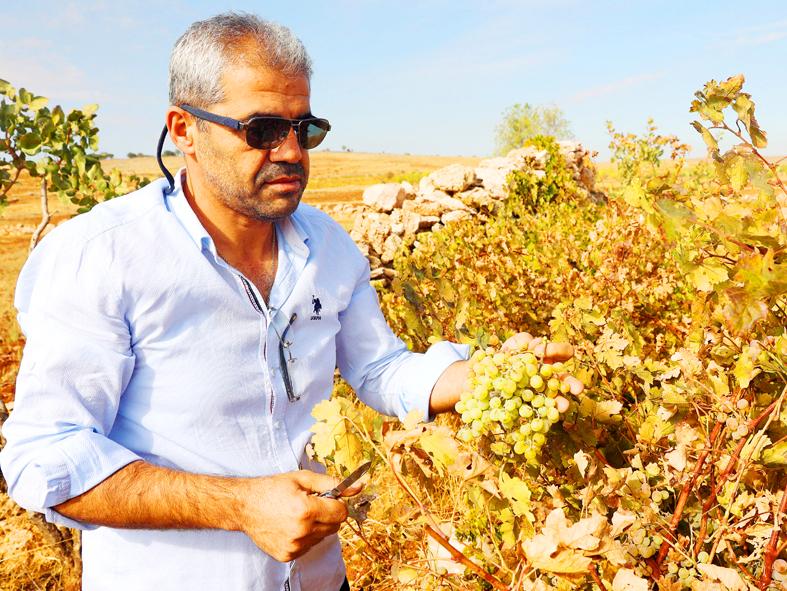Assyrian merchant Yuhanna Aktas no longer has to hide from villagers in his conservative corner of southern Turkey that the grapes they harvest are destined to become wine.
A member of the shrinking Christian minority in Mardin Province, Aktas has been waging a lonely battle for acceptance by his Muslim neighbors and local officials, who frown on alcohol sales.
“Winegrowing and reviving the disappearing Assyrian culture were my childhood dream,” Aktas said, next to barrels of wine fermented from green grapes in Midyat, a town 50km from the Syrian border.

Photo: AFP
Only about 3,000 Assyrians still live in the wider Mardin Province, which is part of the historical Mesopotamia region where some archeologists believe wine was invented 2,700 years ago.
Subjected to discrimination and violence, most of the Assyrians have either relocated to Istanbul or emigrated to the West, reducing their number from 700,000 during the Ottoman Empire to 15,000 across Turkey today.
Their gradual departure over the years has dealt a bruising blow to Mardin’s viticulture traditions, pushing Aktas on a tormented journey to realize his dream.

Photo: AFP
Bespectacled and sporting a hint of a beard, the 44-year-old said he received death threats when he first tried to get wine production rolling in 2009.
“Workers refused to work for me and villagers refused to sell their grapes, saying that wine is forbidden in Islam,” he said.
Yet he persevered, and now sells 110,000 bottles annually throughout Turkey.
The secret to his success was choosing the right local grapes, including a Mazrona variety that has an intense aroma similar to Gewurztraminer grapes used in Alsatian white wines, Aktas said.
Organically farmed and naturally fermented without yeast or sulphites — additives which prolong conservation — the wines have the extra benefit of being much better for your health, Aktas said.
“Other wines can cause headaches because of sulphites. That is never the case with our wine,” he said with a hint of a smile.
Business has been so good that Aktas has launched a second production site in his home village of Beth Kustan, about 30km from the vineyards of Midyat.
Like in other villages across the region, the majority of the original Assyrian families now live in Europe or the US.
Nearly a decade ago, Turkish President Recep Tayyip Erdogan, who was then prime minister, promised to make it easier for these families to reclaim their land, raising hopes for their return.
“Several Assyrians had planned to return to Turkey at the time,” Assyrian Culture Association president Ayhan Gurkan said.
“They renovated their ruined houses, but some saw that their lands had been confiscated by the state or neighboring villagers,” Gurkan said.
The Assyrians’ misfortunes date back to 1915, when many were killed during the genocide of fellow Christian Armenians by Ottoman Turks during World War I. Those who survived and their descendants gradually began to leave.
This exodus accelerated when the first serious clashes erupted between Kurdish militants and the Turkish army across Turkey’s border regions with Syria and Iraq in the 1980s.
A government crackdown on political opponents and the Kurds after a failed coup attempt against Erdogan in 2016 created still more distrust.
Most recently, this febrile atmosphere was exacerbated by the disappearance of an Assyrian couple near the Iraqi border and the conviction of an Assyrian Orthodox priest for “aiding a terror organization.”
“The plans to return home are now suspended,” said Aktas, who himself is facing trial for membership to a group linked to the pro-Kurdish Peoples’ Democratic Party, which Erdogan’s government is trying to ban.
Local sales restrictions and a soaring alcohol tax, which has tripled since Erdogan’s Islamic-rooted Justice and Development Party came to power in 2002, have added to the pressure.
In May, the government banned alcohol sales during a 17-day COVID-19 lockdown, sparking outrage among secular Turks.
However, Aktas said the various attempts to ban or restrict the trade of wine — and his special grapes — have actually helped sales.
“Today, alcoholic beverages are living their golden age in Turkey,” the winemaker said. “The bans have provoked a backlash. Sales have boomed.”
Aktas hopes that something similar could happen to Assyrian culture in Turkey.
“Crushed grapes die during winemaking, but only to start their eternal life through wine,” he said.

Merida Industry Co (美利達) has seen signs of recovery in the US and European markets this year, as customers are gradually depleting their inventories, the bicycle maker told shareholders yesterday. Given robust growth in new orders at its Taiwanese factory, coupled with its subsidiaries’ improving performance, Merida said it remains confident about the bicycle market’s prospects and expects steady growth in its core business this year. CAUTION ON CHINA However, the company must handle the Chinese market with great caution, as sales of road bikes there have declined significantly, affecting its revenue and profitability, Merida said in a statement, adding that it would

MARKET LEADERSHIP: Investors are flocking to Nvidia, drawn by the company’s long-term fundamntals, dominant position in the AI sector, and pricing and margin power Two years after Nvidia Corp made history by becoming the first chipmaker to achieve a US$1 trillion market capitalization, an even more remarkable milestone is within its grasp: becoming the first company to reach US$4 trillion. After the emergence of China’s DeepSeek (深度求索) sent the stock plunging earlier this year and stoked concerns that outlays on artificial intelligence (AI) infrastructure were set to slow, Nvidia shares have rallied back to a record. The company’s biggest customers remain full steam ahead on spending, much of which is flowing to its computing systems. Microsoft Corp, Meta Platforms Inc, Amazon.com Inc and Alphabet Inc are

RISING: Strong exports, and life insurance companies’ efforts to manage currency risks indicates the NT dollar would eventually pass the 29 level, an expert said The New Taiwan dollar yesterday rallied to its strongest in three years amid inflows to the nation’s stock market and broad-based weakness in the US dollar. Exporter sales of the US currency and a repatriation of funds from local asset managers also played a role, said two traders, who asked not to be identified as they were not authorized to speak publicly. State-owned banks were seen buying the greenback yesterday, but only at a moderate scale, the traders said. The local currency gained 0.77 percent, outperforming almost all of its Asian peers, to close at NT$29.165 per US dollar in Taipei trading yesterday. The

The US overtaking China as Taiwan’s top export destination could boost industrial development and wage growth, given the US is a high-income economy, an economist said yesterday. However, Taiwan still needs to diversify its export markets due to the unpredictability of US President Donald Trump’s administration, said Chiou Jiunn-rong (邱俊榮), an economics professor at National Central University. Taiwan’s exports soared to a record US$51.74 billion last month, driven by strong demand for artificial intelligence (AI) products and continued orders, with information and communication technology (ICT) and audio/video products leading all sectors. The US reclaimed its position as Taiwan’s top export market, accounting for